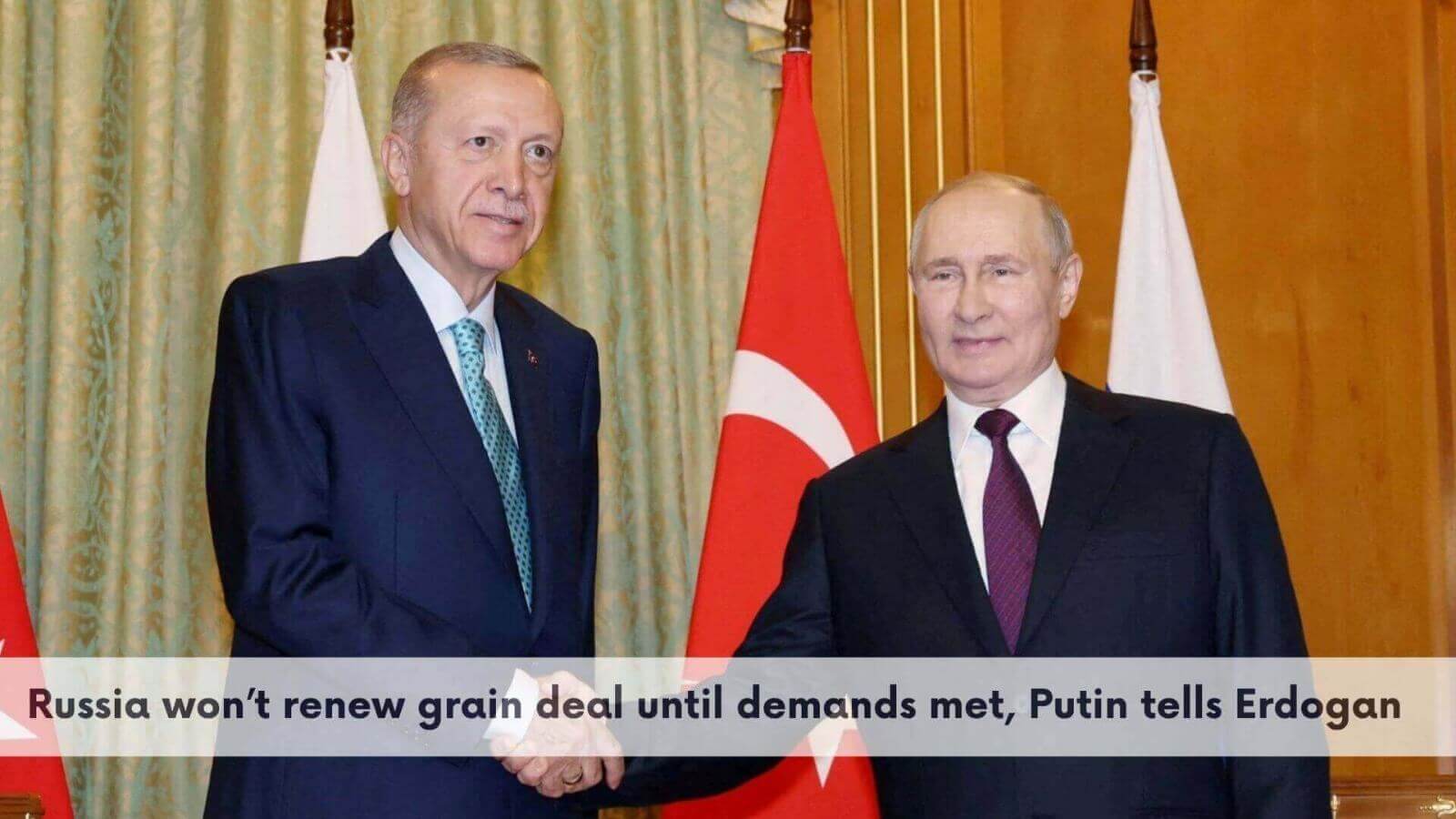As long as the West doesn’t meet its demands, Russia won’t renew the grain deal

6th September 2023
Overview: Grain Deal
Russia has thrown the global grain market into turmoil by announcing its decision not to renew a crucial grain deal with Western nations until its demands are met. This unexpected move has sent shockwaves through the agricultural industry and raised concerns about food security and geopolitical tensions.
For years, Russia has been a key supplier of wheat and other grains to Western nations, including many European countries. The existing grain deal, which had been in place for over a decade, facilitated the export of Russian grain to the West, ensuring a stable food supply for millions of people.
However, recent political developments have strained Russia’s relations with Western nations, particularly in the aftermath of the Ukraine crisis and ongoing disputes over sanctions. In response to what it perceives as unfair treatment and encroachments on its sovereignty, Russia has chosen to weaponize its agricultural exports.
Demands from Moscow
The Russian government, led by President Vladimir Putin, has outlined a series of demands that must be met before it agrees to renew the grain deal. Among these demands are
- Sanctions Relief: Russia is insisting on a significant easing of Western sanctions, including those imposed in response to its actions in Ukraine and other international disputes. The Russian government argues that these sanctions have harmed its economy and are unjust.
- Recognition of Crimea: Moscow has long sought international recognition of its 2014 annexation of Crimea from Ukraine. Russia considers Crimea a part of its territory, but most Western nations view the annexation as illegal and have not recognized it.
- Non-Interference in Internal Affairs: Russia is calling for a commitment from Western nations to refrain from interfering in its internal affairs, particularly in relation to domestic politics and elections.
- Respect for Its Sphere of Influence: Moscow insists on Western acknowledgment of Russia’s historical and geopolitical interests in neighboring countries, often referred to as its “sphere of influence.”
- NATO Expansion Halt: One of the most contentious demands is for Western nations to halt the expansion of NATO (North Atlantic Treaty Organization) into Eastern Europe, which Russia sees as a direct threat to its security.
These demands have sparked intense debate and controversy among Western leaders. While some argue that concessions may be necessary to secure a stable food supply, others view this move by Russia as blatant economic blackmail.
Global Ramifications
The refusal to renew the grain deal has far-reaching implications for the global grain market and food security. Russia is one of the world’s largest exporters of wheat, and any disruption in its grain supply can have a cascading effect on global prices and availability.
European countries, in particular, rely heavily on Russian grain imports to meet their food and animal feed needs. The sudden suspension of this vital supply source could result in higher food prices and potential shortages, affecting consumers and businesses alike.
Furthermore, this move by Russia could lead to increased competition for alternative grain sources, putting additional strain on global grain producers. Countries like the United States, Canada, and Argentina might be able to fill some of the supply gap, but logistical challenges and increased demand could lead to supply chain disruptions.
Global Response and Diplomatic Efforts
Western leaders have responded cautiously to Russia’s demands. Diplomatic efforts are underway to find a peaceful resolution to the crisis. However, finding common ground on issues as complex and politically charged as sanctions, territorial disputes, and security concerns is a daunting task.
The European Union, which heavily relies on Russian grain imports, is in a difficult position. It must balance its commitment to upholding international norms and principles with the practical need to ensure a stable food supply for its citizens. The EU is actively engaged in negotiations with Russia, hoping to find a compromise that safeguards both food security and political principles.
The United States, while not as reliant on Russian grain imports as Europe, is also concerned about the broader geopolitical implications of this move. The Biden administration has expressed its commitment to diplomacy and is exploring avenues for dialogue with Russia while maintaining a tough stance on issues such as sanctions and NATO.
Uncertainty Looms
As negotiations between Russia and Western nations continue, uncertainty looms over the global grain market. The longer the dispute persists, the greater the risk of price volatility and supply disruptions. Farmers, food producers, and consumers around the world are watching closely, hoping for a swift and peaceful resolution to this crisis.
In the face of these challenges, the international community must work together to ensure food security and address the underlying political issues that have led to this crisis. The Russia-West grain deal serves as a stark reminder of the interconnectedness of food, politics, and security in today’s globalized world.
The coming weeks and months will be critical in determining whether Russia’s demands are met and if the global grain market can weather this storm. The stakes are high, and the world is watching as leaders grapple with the complex task of balancing political interests and the basic need for sustenance.
Click here to join our Telegram chanel
You will get information, news, and support related to Merchant Navy.
